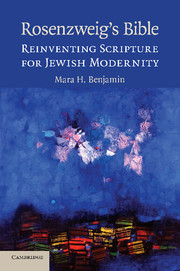Book contents
- Frontmatter
- Contents
- Acknowledgments
- Introduction: The Decline and Renewal of Scripture
- 1 Scripture in The Star of Redemption
- 2 Yehudah Halevi: The Creation of a Scriptural World
- 3 Bible Translation and the Shaping of German Identity
- 4 Toward a New Encounter with the Bible
- Conclusion: Scripture Today – Some Considerations
- Works Cited
- Index
Introduction: The Decline and Renewal of Scripture
Published online by Cambridge University Press: 01 July 2009
- Frontmatter
- Contents
- Acknowledgments
- Introduction: The Decline and Renewal of Scripture
- 1 Scripture in The Star of Redemption
- 2 Yehudah Halevi: The Creation of a Scriptural World
- 3 Bible Translation and the Shaping of German Identity
- 4 Toward a New Encounter with the Bible
- Conclusion: Scripture Today – Some Considerations
- Works Cited
- Index
Summary
Every year, new books appear offering guidance on how to read the Bible. Often written by eminent scholars for laypeople, they aim to address the yawning chasm in the public's cultural and spiritual education. These volumes not only battle an educational system long in decline; they face an intellectual situation, centuries in the making, in which the Bible's singular status has eroded. Transformed beyond recognition where not simply discredited, the Bible today is largely the object either of literalist fanaticism or even-tempered apathy. In college classes, one might find the Bible taught as a literary and cultural possession to be studied, but certainly not as revelation.
This state of affairs is only partly attributable to the necessary concessions to life in a pluralistic liberal democracy. More fundamentally, it reflects the undeniable power of modern science, philosophy, and history as our primary tools for making sense of the world. Simply put, the Bible of earlier centuries is no longer accessible. Our understanding of the natural world, historical time, and the human psyche precludes the possibility of finding meaning in scripture's “simple sense.” The rise of modern anthropology and its investigation of the literary and oral canons of non-Western cultures and traditions have further demolished the potential for the “The Bible” to be, as its etymology would have it, The Book. The Bible is, in short, no longer “scripture,” an object of veneration regarded as foundational to religious tradition and human life.
- Type
- Chapter
- Information
- Rosenzweig's BibleReinventing Scripture for Jewish Modernity, pp. 1 - 25Publisher: Cambridge University PressPrint publication year: 2009



